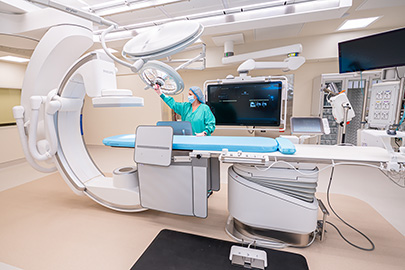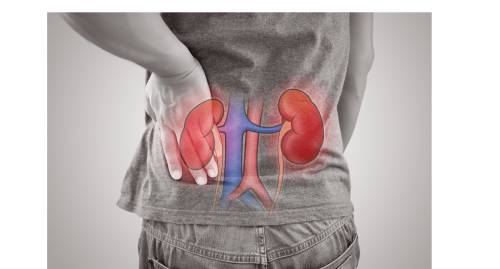
Research
First-of-its-Kind Clinic Aims to Improve Your Heart Health
4 min. read
Baptist Health Miami Cardiac & Vascular Institute
As the medical community grows increasingly aware of the role cardiometabolic syndrome plays in other chronic conditions, cardiologists at Baptist Health Miami Cardiac & Vascular Institute are pioneering a new approach – and seeing impressive results – with the region’s first-ever Cardiometabolic Clinic.
“Each year, we’re learning more about how prevalent cardiometabolic disorders are,” says Adedapo Iluyomade, M.D., a preventive cardiologist who helps lead the Cardiometabolic Clinic and other programs at Miami Cardiac & Vascular Institute. “It’s really about how all of these different conditions – obesity, diabetes, kidney disease and cardiovascular disease – are feeding off of each other.”

Adedapo Iluyomade, M.D., a preventive cardiologist at Baptist Health Miami Cardiac & Vascular Institute
According to the Journal of the American College of Cardiology (JACC), approximately 47 million people in the United States are affected by cardiometabolic syndrome, which it says is comprised of interrelated factors that increases one’s risk of developing cardiac disease. Such factors include abdominal obesity, hypertension, elevated glucose levels or diabetes, and dyslipidemia, the JACC says.
Half of America will be obese by 2030
Dr. Iluyomade says that the metabolic disorder underlying these conditions is now becoming a treatment target as new therapies are developed and approved. And, he adds, new treatments for obesity are quickly becoming a game-changer for patients who have or are at risk for cardiovascular disease.
“By 2030, 50 percent of the U.S. is expected to suffer from obesity, which we now recognize as a chronic condition just like hypertension, high cholesterol and diabetes,” Dr. Iluyomade says. “We finally have treatments for obesity that will benefit the population. And by treating obesity, we’re able to treat all of these other conditions and significantly reduce the patient’s cardiovascular risk.”
A clinical trial presented at a recent American Heart Association (AHA) meeting showed for the first time the effectiveness of the drug semaglutide, which currently is approved by the U.S. Food & Drug Administration (FDA) only “for chronic weight management in adults with obesity or overweight with at least one weight-related condition (such as high blood pressure, type 2 diabetes, or high cholesterol), for use in addition to a reduced calorie diet and increased physical activity.”
According to Dr. Iluyomade, the study found that reducing weight in those who did not have diabetes led to a 20 percent reduction in major adverse cardiovascular events. “That is a big development,” he says. In addition, the FDA recently approved tirzepatide for the indication of weight loss, which Dr. Iluyomade says “only adds to our arsenal of drugs that target obesity as a chronic disease.”
Treating cardiometabolic syndrome takes a village
The JACC says that, due to the direct impact that these risk factors and associated disorders have on developing cardiovascular disease, “a collaborative, multifaceted team approach is considered key in providing early assessment and targeted interventions to lower cardiometabolic risks.” It recommends bringing together “the efforts of cardiologists, primary care providers, endocrinologists and additional specialists” to better manage patients with cardiometabolic disease.
And that, says Dr. Iluyomade, is exactly what patients get when referred to the Cardiometabolic Clinic. Patients are cared for and followed closely by a team of professionals led by his colleague Lisa Davis, PA, a clinical lipid specialist and APP manager of cardiovascular risk reduction programs at Miami Cardiac & Vascular Institute.

Lisa Davis, PA, clinical lipid specialist and APP manager of cardiovascular risk reduction programs at Baptist Health Miami Cardiac & Vascular Institute
According to Ms. Davis, the Clinic’s team-based collaborative care model is unique. Each patient is cared for by a team that includes a nurse navigator, dietician, pharmacist, diabetes educator, patient care coordinator, physician assistant and physician – each of whom is a partner in the patient’s health.
“We don’t just prescribe medications and say to the patient, ‘Here you go, we’ll see you back here in six months,” Ms. Davis states. “We take a holistic approach to their care based on the most recent clinical guidelines. We can do a good job of significantly lowering a patient’s overall cardiovascular risk and can help them achieve their health goals – not just with medications but also with lifestyle modifications and patient education.”
While the Clinic’s primary focus is on the highest risk patients – those who have established cardiovascular disease or heart failure in addition to have diabetes – prevention is also a top priority, Ms. Davis says.
“Cardiovascular events and disease are often preventable,” she says. “If a person’s risk factors are identified and treated early enough with guideline-directed medical therapies based on evidence-based medicine, we can significantly lower their cardiovascular risk.” Currently, Ms. Davis adds, the Cardiometabolic Clinic is following more than 200 patients and getting referrals for another 20 or so every month.
A multi-disciplinary team-based approach
Dr. Iluyomade says the primary benefit for the patients followed at the Clinic is that they receive highly individualized, multidisciplinary care that is delivered all in one setting.
“The traditional healthcare model for patients with cardiovascular disease typically includes a primary care physician, a cardiologist, an endocrinologist, a nephrologist (kidney doctor) and dietitian, all of whom are working independently in their own silos and who may or may not be communicating with each other,” Dr. Iluyomade points out. “In the Clinic, we are able to address all of their chronic conditions related to cardiometabolic syndrome in one place.”
With cardiometabolic syndrome growing in prevalence and recognition in the U.S., Dr. Iluyomade says he hopes more and more patients will take advantage of the comprehensive care provided by Miami Cardiac & Vascular Institute’s Cardiometabolic Clinic.
“We have great therapies and strategies for treating cardiometabolic syndrome now,” he says. “In the preventive cardiology field, this is really getting to the root of the problem for a lot of patients and we’re happy we’re able to do that.”
Healthcare that Cares
Related Stories
View All Articles
What Exactly is ‘Cardiovascular Kidney Metabolic Syndrome’ and Why It’s So Important
March 28, 2024
3 min. read

New Hybrid Endovascular Suite Offers Care for Complex Cardiovascular Conditions
March 26, 2024
2 min. read
